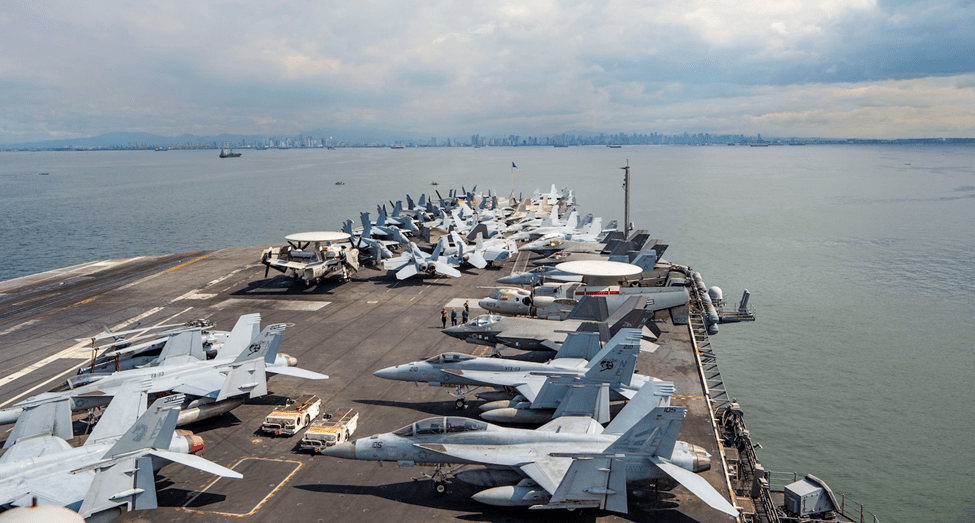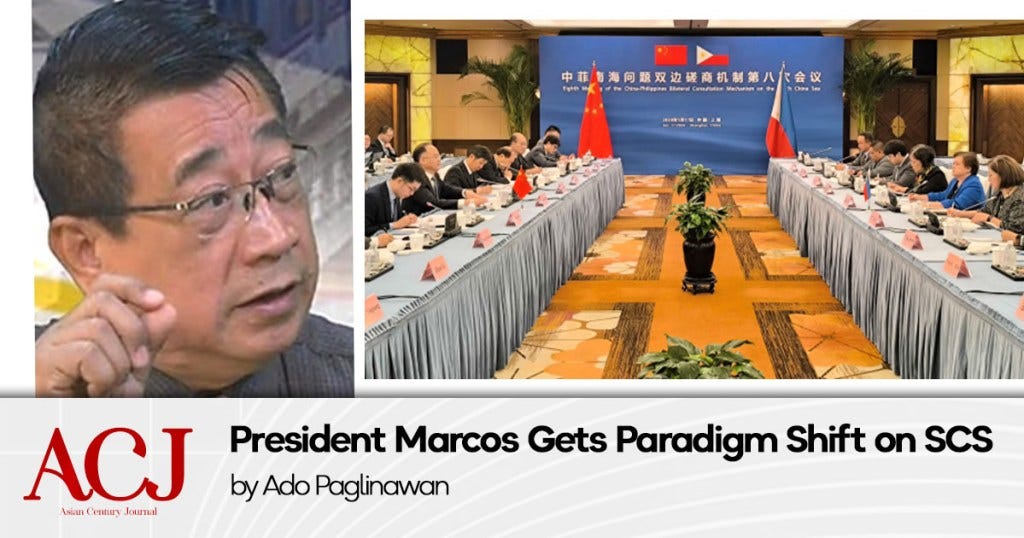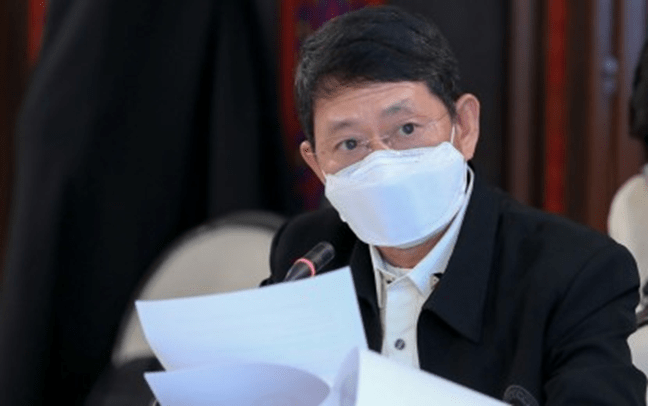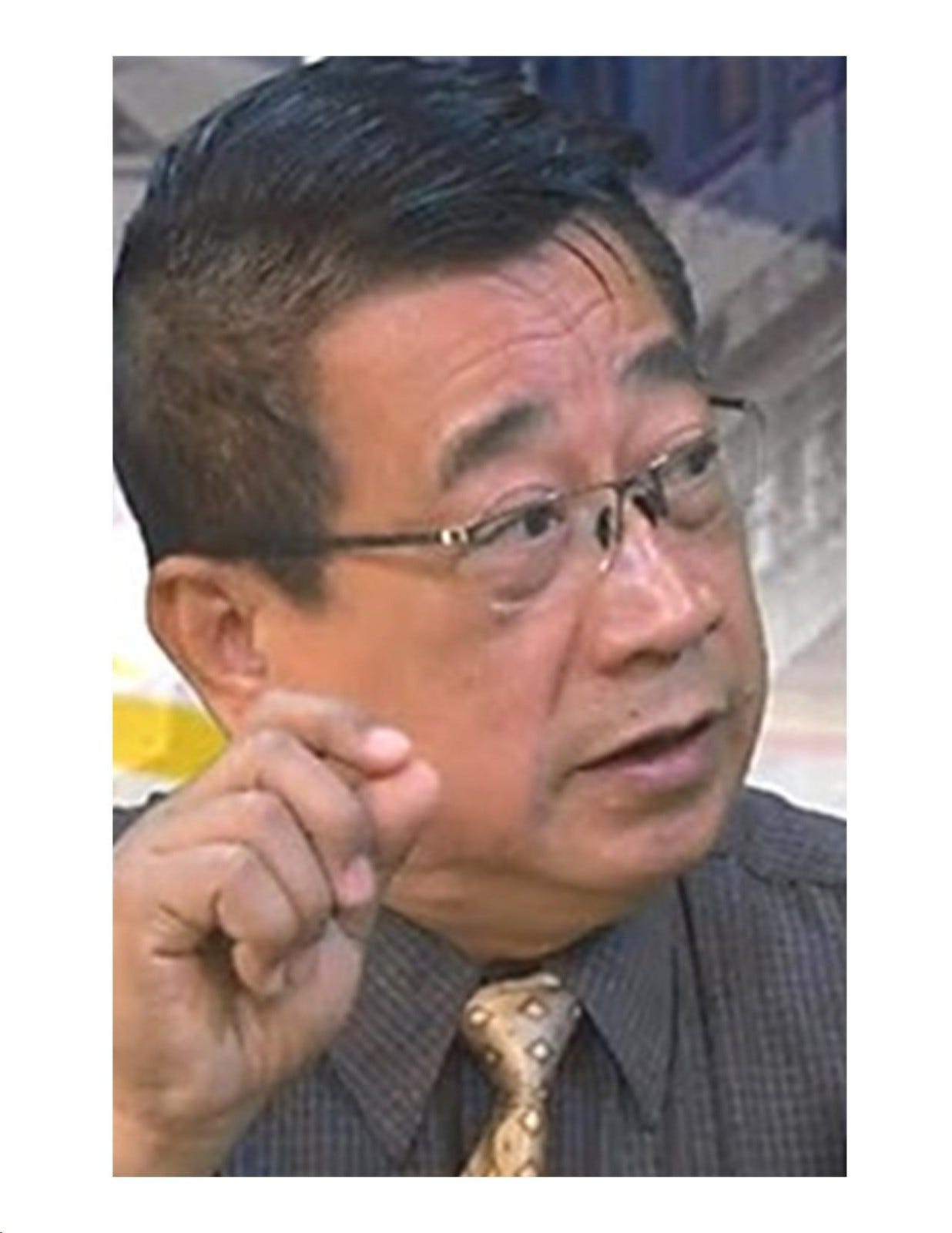President Marcos Gets Paradigm Shift on SCS
Part One of Three: Repairing Serious Damage Saboteurs Dealt on PH-CH Relations
On December 19, 2023, President Ferdinand “Bongbong” Marcos Jr. called for a paradigm shift in South China Seas admitting that confrontations in the disputed waters have fallen into a pattern:
“We have to do something what we have not done before. We have to come up with a new concept, a new principle, a new idea so that we move, as I say, we move the needle the other way. It’s going up, let’s move the needle back, so that paradigm shift is something that we have to formulate.
“The Philippines had engaged in after-the-fact methods of diplomacy after each incident by sending a note verbale and the Philippine Embassy would send a démarche to the Chinese Foreign Ministry. Marcos emphasized, that he does not want any more incidents, as mistakes tend to trigger violent conflicts.”
Perceptively, the President added, “Even if we go up to the desired level of spending on defense, up to percent of GDP (gross domestic product), we will still be very — not comparative in terms of actual military force to the Chinese.”
The next day, Secretary of the Department of Foreign Affairs Enrique A. Manalo promptly requested for a telephone conversation China’s Foreign Minister Wang Yi in Beijing which was quickly accepted.
Manalo said “the Philippine side is willing to strengthen dialogue with China in good faith, make good use of the role of bilateral communication mechanism on maritime issues, and jointly seek a solution to the issue.”
Yi clarified the Chinese perspective, “the severe difficulties facing China-Philippines relations right now are rooted in the fact that the Philippine side has changed its policy stance so far, reneged on the promises it has made, constantly made provocations at sea, and undermined China’s legitimate and lawful rights.”
The Chinese foreign minister acknowledged “China-Philippines relations now stand at a crossroads, advising the Philippine side “not to continue in the wrong direction, but to exercise prudence and return to the right path as soon as possible. China is always committed to resolving differences through dialogue and consultation to jointly maintain maritime stability.”
Yi finally expressed concern that if the Philippine side misjudges the situation, acts stubbornly, or even colludes with ill-intentioned external forces to continue to stir up troubles, China will [be constrained to] defend its rights in accordance with the law and respond resolutely.
The two sides agreed to hold a meeting of the Bilateral Consultation Mechanism on the South China Sea at an early date and actively create favorable conditions for it.
Asean worries
Foreign ministers of Southeast Asia’s regional bloc ASEAN on December 30, expressed worry over growing tensions in the South China Sea which they said could undermine peace, security, and stability in the region and urged for peaceful dialogue among parties.
The statement came as China and the Philippines have traded accusations in recent months over a series of maritime run-ins and as Manila cited the need to change its approach since diplomatic efforts were headed in a “poor direction”.
China has described the accusations as “purely false hype”, and said it will not turn a blind eye to repeated “provocations and harassment” by the Philippines.
The bloc’s top diplomats also reaffirmed the need to “exercise self-restraint in the conduct of activities that would complicate or escalate disputes”.
ASEAN and China have worked towards creating a code of conduct in the South China Sea, a plan dating back to 2002. But progress has been slow despite commitment by all parties to advance and speed up the process.
Shortened Joint Patrols
On December 28, Manalo also had a phone conversation with US Secretary of State Antony Blinken on “issues of mutual concern”, including the ongoing tension in the South China Sea. His call with Blinken came after he said he had a “frank and candid” call with China’s Foreign Minister Wang Yi, on the territorial dispute between Manila and Beijing.
Proof that the Manalo-Yi conversation, shook the Philippine side and weighed heavily in favor of the rebalancing PH-China relations, manifested in the recalibration of Joint Patrols between the AFP and the US assets immediately following.
On January 3, 2024, the Armed Forces of the Philippines (AFP) and the US Indo-Pacific Command was scheduled to start their 2nd maritime cooperative activity (MCA) in the South China Sea, where four Philippine Navy vessels and air assets teamed up with four US Navy vessels from the Carrier Strike Group (CSG) 1 which included the USS Carl Vinzon (CVN-70) aircraft carrier, a cruiser, two destroyers and multiple combat aircraft.
US Navy destroyer USS Sterett (DDG- 104), one of the escort ships of the USS Carl Vinson, was the only American ship to arrive at the meeting point off Mindoro, for the exercises. Two other US warships and the USS Carl Vinson were expected to join but did not show up due to “operational necessity.”
The scheduled photo exercise and gunnery exercises were thus canceled and the three-day activity was shortened to two, with the Philippine Navy ships and the USS Sterett limiting their activity to a passing exercise.
Philippine military officials, however, were still able to fly out the next day for an AFP helicopter landing on the deck of the USS Carl Vinson, to observe the operations of US fighter jets.
No specifics were given, other than officials were “adjusting to the operational situation on the ground.”
Before arriving in Manila, the US Navy said the Seventh Fleet conducted trilateral maritime exercises with the Japan Maritime Self-Defense Force and Republic of Korea Navy, which provided an opportunity for the three maritime forces to sail together and conduct enhanced planning and advanced maritime communication operations.
The People’s Liberation Army Southern Theater Command has gone on high alert after the USS Carl Vinson and Philippine assets made their joint patrols. Two Chinese vessels were also sent to shadow the ships in the maritime exercises.

As the USS Carl Vinson did a port call to Manila on January 5, Beijing reminded the Philippines that the US and Philippines’ muscle flexing, provocative military activities in the South China Sea are not conducive to managing the situation on the sea and handling maritime disputes.
Obviously detached from President Marcos efforts to thaw deteriorated relations between the Philippines and China, National Security Adviser Eduardo Año lashed back at China saying, “We wish to clarify that the joint maritime activities between the Philippines and the United States were clearly conducted within our exclusive economic zone and are consistent with international law, particularly the United Nations Convention on the Law of the Sea, so how can they be deemed provocative?”
Setting the record straight
I would have given a pass to the national security adviser’s statement had he not uttered pontifications that have no basis in fact and in law: Excuse me but “clarify” is my family name and to make this pass is to condone a serious disinformation.
Ano admitted this was an activity between the Philippines and a foreign country. He also said that since the activities were done within 200 nautical miles or what he claimed as EEZ, he said this was consistent with international law, citing in particular UNCLOS. These were his talking points.
Well to begin with, UNCLOS is not the entirety of international law.
China is in effective control of the affected territorial waters, and in customary international law this means sovereignty, whether Eduardo Ano accepts it or not.
Second, his claim for an EEZ doesn’t wash because, EEZs cannot overlap with sovereignty unless the sovereign allows it.
Worst, activities of this nature are not consistent with international law, particularly UNCLOS.
Was this innocent passage?
I would highly recommend his reading of UNCLOS, sharing copy with his spokesman Jonathan Malaya.
Article 18 includes territorial waters: “Meaning of [Innocent] passage 1. Passage means navigation through the territorial sea [repeat territorial sea that means as early as 12 nautical miles] for the purpose of: (a) traversing that sea without entering internal waters or calling at a roadstead or port facility outside internal waters; or (b) proceeding to or from internal waters or a call at such roadstead or port facility.
“2. Passage shall be continuous and expeditious. However, passage includes stopping and anchoring, but only in so far as the same are incidental to ordinary navigation or are rendered necessary by force majeure or distress or for the purpose of rendering assistance to persons, ships or aircraft in danger or distress.”
Prohibitions are outlined in Article 19: “(a) any threat or use of force against the sovereignty, territorial integrity or political independence of the coastal State, or in any other manner in violation of the principles of international law embodied in the Charter of the United Nations; (b) any exercise or practice with weapons of any kind; (d) any act of propaganda aimed at affecting the defence or security of the coastal State; (e) the launching, landing or taking on board of any aircraft; (f) the launching, landing or taking on board of any military device;” [truncated]
As you can read there are prohibitions of conduct even in our own territorial seas and so afortiori [with more reason] outside that 12 nm. So, how can the misconduct extend even to 200 nm miles of “exclusive” economic zone. When that licentiousness occurs, two coastal states now become involved – China that asserts sovereignty and effective control and the Philippines that insists its sovereign rights can overlap with another state’s sovereignty.
International law is not there only to guide as to who is right and who is wrong, but mostly to avoid anything prejudicial to the peace, good order or security of neighboring states.
Filipinos not naive
Mr. Ano, “conduct enhanced planning and advanced maritime communication operations” against what and against whom? The Filipino people can see through your armor, especially after the Philippine side had conducted itself in the South China Seas, disregarding existing protocol observed before the Marcos administration’s pivot to the US.
Of the additional four bases that President Marcos allowed, three were close to Taiwan and only one facing the Spratlys.
I hope the Mr. Ano does not consider this coincidental to the US Naval Institute’s “Project Myushou” to introduce dissonance euphemistically labeled as “transparency” in the SCS, and the US Air Force’s “Agile Combat Employment” which so far completes the Americans’ pivot to the Asia-Pacific.
Not me but blogger Mike, responding to this article that appeared in the Philippine Star last January 6, commented: “Philippine lapdog of US still hiding its intentions with denial and double faced.”
To be continued.
Next: Charlatans Sabotaging PBBM’s Way Back to Peace, Progress.
Adolfo Quizon Paglinawan
is the anchor of Ang Maestro – the Unfinished Revolution at Radyo Pilipinas1, co-host of Opinyon Ngayon at Golden Nation Network Television, a political analyst, and author of books.
His third book, The Poverty of Power will soon be off-the-press. It is a historiography of controversial issues of spanning 36 years leading to the Demise of the Edsa Revolution and the Rise of the Philippine Phoenix. Paglinawan’s past best sellers have been A Problem for Every Solution (2015), a characterization of factors affecting Philippine-China relations, and No Vaccine for a Virus called Racism (2020) a survey of international news attempting to tracing its origins. These important achievements earned for him to be named one of the 2021 international laureates for the Awards for the Promotion of Philippine-China Understanding. Ado, as he called for short, was a former press attaché and spokesman of the Philippine Embassy in Washington DC and the Philippines’ Permanent Mission to the United Nations in New York. Facebook
Email: contact@asiancenturyph.com
Facebook: https://www.facebook.com/asiancenturyph/
Twitter: https://twitter.com/AsianCenturyPH






